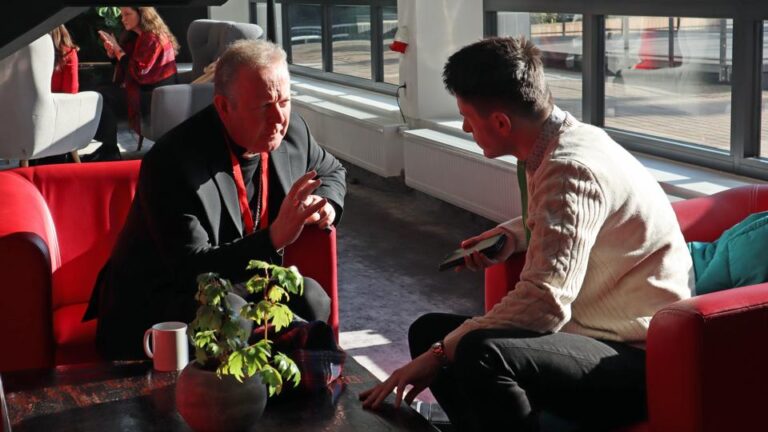
The big news in the world of the Synod this week has been the European continental synod assembly in Prague.
Bishops and priests, laity, and protesters flocked to the Czech capital for what was formally billed as further discernment but felt to many like a turning point in the life of the European Church. Competing waves of news reports and social media smoke signals made it tricky to tell what was really happening, but luckily for you, the Synodal Times’ intrepid reporter Brandon Scott was on the scene. He was providing live updates via the Synodal Times scandalously under-followed Twitter feed. As the picture below attests, he also scored an extensive interview with Archbishop Eamon Martin of Armagh, which you can read here.
It’s also worth looking at the Irish delegates powerful submission on the need to reconcile ‘the wounds of abuse’ and Bishop Brian McGee of Argyll and the Isles reflections on some of the divisions that emerged during the week.
I thought it would be interesting to get Brandon’s view from the conference floor, and get a sense of the mood, the vibe, and what it all means. So I spoke to him while he was in the thick of it and conducted the following interview.
Hi Brandon! What were your first impressions of The Continental Assembly in Prague?
It has been a peculiar one to define! I’ve been constantly reminded that no insights will be formed at this event. Documents meditated on, groups convened, issues discussed – but no reform. All expected from an event that was consigned to the category of “footnote” in the journey of the Church’s Synod. But any advance fears that meetings may degenerate into petty squabbles and threats of riots, mirroring the Church in Germany’s last synodal assembly in September have been unfounded as of now. In fact, the mood is calmly positive.
What’s been the tone from Church leaders in Prague?
I interviewed the President of the Council of the Bishops’ Conferences of Europe and Archbishop of Vilnius, Gintaras Grušas, an affable man who speaks deliberately and thinks proportionately. Here he emphasised that the Synod must only be viewed as a long-term project, as per the wishes of Pope Francis. To summarise, meaningful change will not happen overnight, or even in a year.
What are the activist groups saying, I know there’s been some protests?
I spent most of one day with We Are Church (WAC) international – whose enthusiasm is boundless and somewhat militant. Representatives from Austria, Germany and Ireland all congregated at the bottom of the steps to greet bishops they knew and inquire about the latest updates as if it were a football score. WAC (notoriously difficult to please) were quite satisfied with the event and Synod overall and the mantra of many conservatives has been if WAC are happy, we’re apparently losing.
Who have you met that’s really stayed with you?
The most interesting person I met was an Austrian woman, Martha Heizer, who was excommunicated by the Church in 2014, amazingly under the benevolent Pope Francis and not domineering Benedict, for celebrating Mass without a priest. She is also involved with WAC and the representatives briefly spoke with Bishop Georg Baetzing as he passed-by. This was a poignant moment. A woman renounced by her Church but accepted by an incumbent and dare I say a person of increasing stock in the Catholic Church. I was overcome with a feeling of, “hang on a moment, what’s going in here?!” in both the encounter and the implications of the brief discussion. Will forgiveness be more easily granted a post-Synod Church?
Final takeaways?
There was a sense of just another day at the office for me and not one of monumental change. I think the fullness of time may show that I was proven wrong however. Something feels afoot but nobody really knows what it is.
That uncertainty is, I suspect, one of the reasons why some have been so resistant to the synod. A lot of Catholics love certainty, they want the black and white. Hell, I don’t mind it a bit of absolute morality, myself but the older I get the more I see the spaces in between. The Synodal Church seems to be leading us there. Will we follow?
Now if you liked this, please pass it on to a friend. If you are that friend you can subscribe here. And if you really liked it you can support our work here. And please do get in touch if any of the above sparked a stray thought.
God Bless,
Ian



